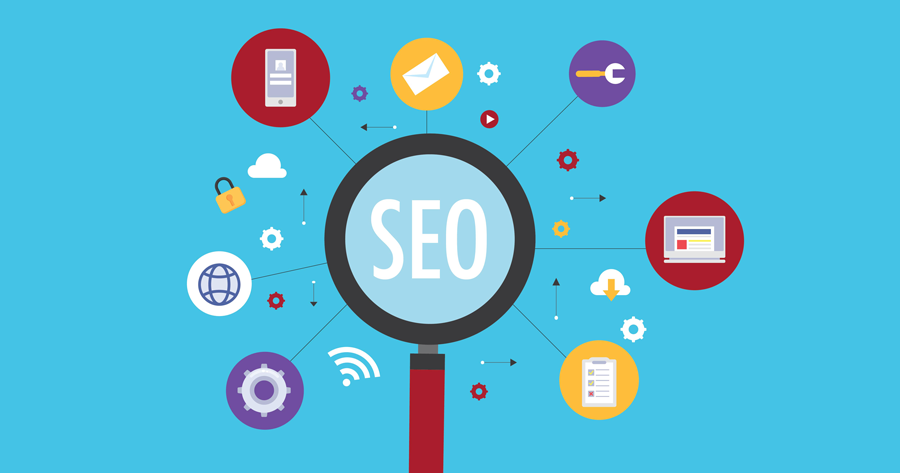When a person searches for a product on Google – World’s largest search engine, many websites pop up but few are seen on the first page. While some have paid to show, the rest are shown organically, meaning they aren’t advertised by paying Google. They are said to be ranked according to a strategy called Search engine optimization (SEO). It is important to make sure your website is optimized for visibility.
The top result on Google has a 33% chance of getting clicked. That means if you’re not number one on the page, you just missed out on a third of potential traffic. What’s even more astonishing is that 75% of people won’t even click on the second page of the search results. The higher your website ranks, the more people will click on your site, and just by getting more site traffic, you’ll have more visibility, improved traffic and more people are likely to do business with you.
SEO strategy and marketing efforts help your website appear higher in search rankings and increase your website visibility on Google.
Although it is important to hire a professional SEO expert to help you optimize the contents of your website, it is important you alos have a knowledge of this so as to know and observe how well optimized your website is. There are important SEO terms you should pay attention to, as they are integral to how well your web page will rank on the search engine.
Page Titles
Also known as the title tag, is a short description of a webpage and appears at the top of the search engine results pages (SERPs). The page title should include the page’s keyword. This is a smart way for your website to be easily found online.
Meta Descriptions
A Meta description is an attribute that gives information about your page. Your meta description appears on the search engine page when a user searches for your site’s keyword. It is directly under your meta title The description doesn’t directly influence ranking but it does influence whether a user clicks the page title and in Google search, words that you searched are bolded within the meta description, making your description visually stand out.
Image alt-tagging
ALT attributes are descriptive text to an image that can be accessed by screen readers browsers used by people with a visual impairment. It specifies an alternate text for an image, if the image cannot be displayed.
Apart from visually impaired people, the alt attribute provides alternative information for an image if a user for some reason cannot view it – due to slow connection, an error in the src attribute, or if the user uses a screen reader.
This text not only improves the accessibility of your pages but also strengthens image search results.
Written on-page content
The words on your website pages and how you format headings can influence your page ranking. A minimum word count to aim for is 1,500 words. Headlines should include keyword-rich phrases because search engines’ algorithms (and people) scan the headings to understand what the content is about. Know your audience and write the copy for them. Chunking your content makes it easier to read. Use visual elements to support the content.
Heading
The heading acts as an information guide for the search engine bots. They give a sequential structure to your post.
There are six heading elements: H1, H2, H3, H4, H5, and H6 with H1 being the highest (or most important) level and H6 the least. The H1 heading is the first impression people get when they spot your content in a search engine. For this reason, it has to clearly state what the reader will learn by viewing your article. The keywords included in your Title must be found in the H1.
Use Outbound Links
Linking contents across websites is one way a website ranks high on Google. While there are other types of link, outbound links is one of the most effective ways of getting a good rank in Google. Outbound links are links within a content that points to a context from another website. Writers often use outbound links to back up information in their articles and link out to authoritative sources.
Linking out to high-quality sites that tells search engines that your site is connected to other sites that offer valuable content. Getting a link back to your site from a high-quality site is even better for your SEO. You can get backlinks by sharing really high-quality content on your site or guest posting on more popular websites.
Add fresh content
Your website is never really done. You need to be regularly adding new quality written content and updating old content, for example, page updates and blog posts. Creating content and adding it to your site can be challenging for small businesses, but it must be done to increase your organic search visibility.
The content on your website shouldn’t be only written words. Pictures are great too, but there’s more you can add to improve your SEO ranking. Consider adding other multimedia elements such as videos, slideshows, or audio to your site. All of this can help improve the user experience, create more visit to your page and help your ranking.
Google My Business page
Google My Business is another way to get visibility on Google. You need to sign up (and verify) a GMB page for your small business. Fill out your profile with as much information as possible. Put in your logo, add photos, add descriptions, make a post, get reviews. You need this page so that when people search for your business and services (on Google or Google Maps) you show up in the listings. The majority of our site traffic comes from Google and we get our clients to set up and build out this page with every site we build. It’s that important.
